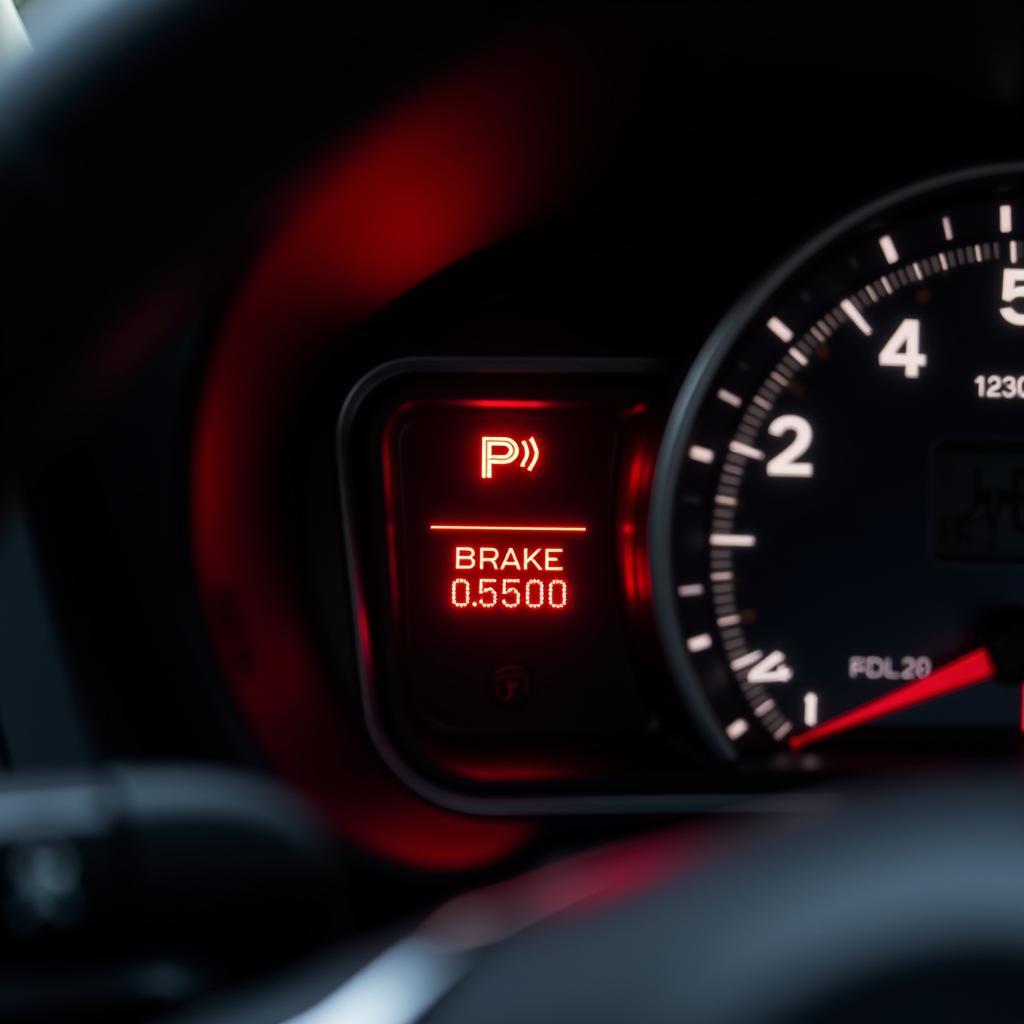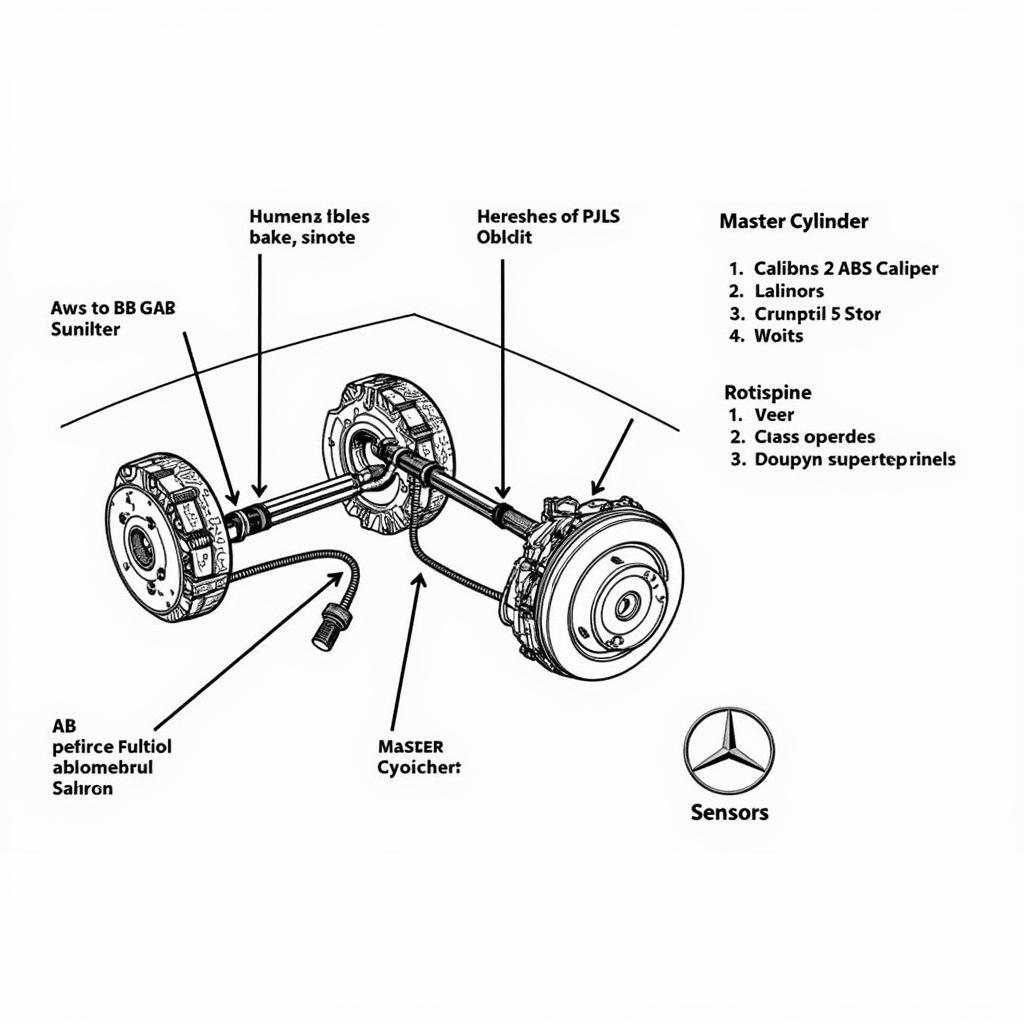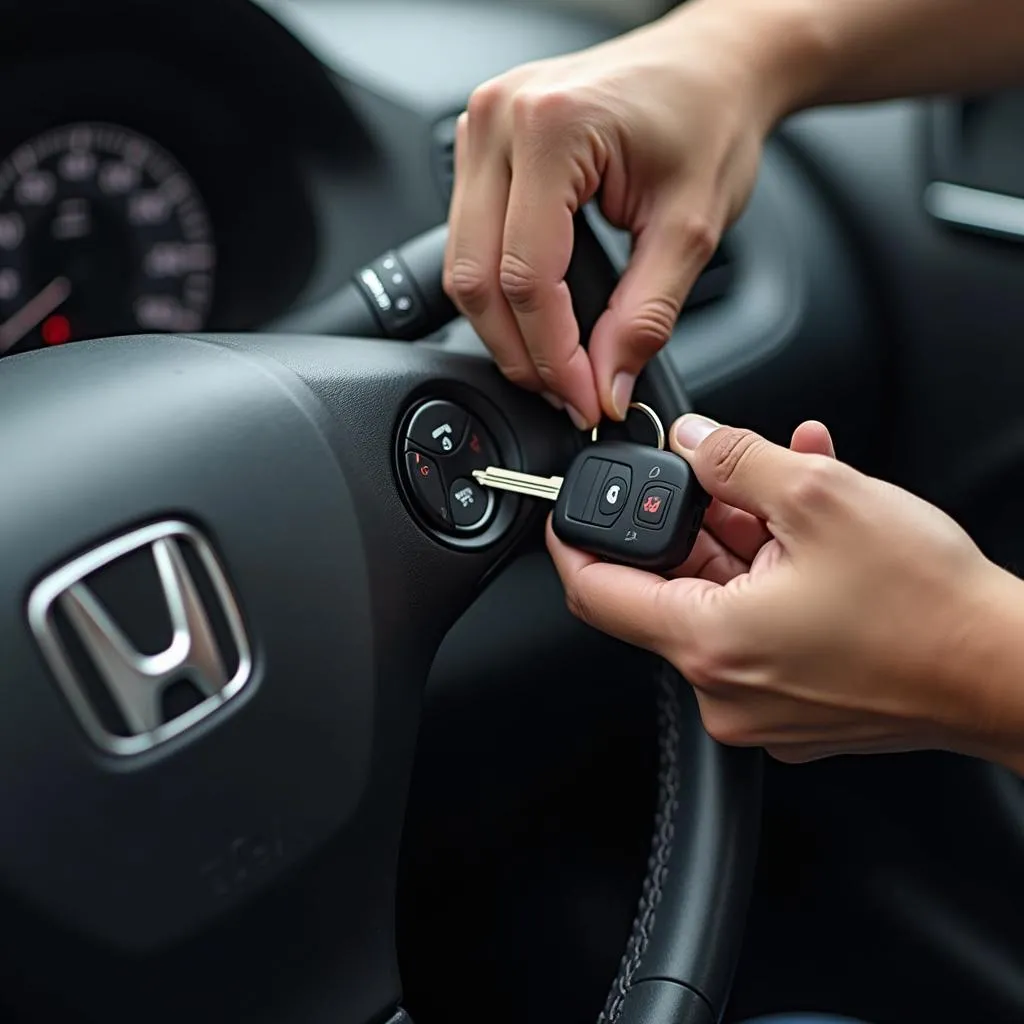The brake warning light on your Mercedes-Benz dashboard is a crucial safety feature. It’s designed to illuminate if your vehicle’s onboard systems detect an issue within the braking system. Ignoring this light could lead to brake failure and an increased risk of accidents.
This comprehensive guide will explore the common causes of a Mercedes brake warning light, how to diagnose the problem, and the potential solutions.
Understanding Your Mercedes Brake Warning Light
The brake warning light can illuminate in different ways, each indicating a different issue:
- Solid Red Light: This typically signifies a serious problem, such as low brake fluid or a malfunction within the hydraulic system.
- Flashing Red Light: This often indicates a critical issue with the ABS (Anti-lock Braking System) or ESP (Electronic Stability Program).
 Mercedes Brake Warning Light on Dashboard
Mercedes Brake Warning Light on Dashboard
Common Causes of a Mercedes Brake Warning Light
Several factors can trigger the brake warning light on your Mercedes. Here are some of the most common culprits:
1. Low Brake Fluid
Brake fluid is the lifeblood of your braking system. It transmits the force from your foot on the brake pedal to the brake calipers, causing the vehicle to stop. Low brake fluid levels are a primary cause of the brake warning light.
Possible reasons for low brake fluid:
- Worn Brake Pads: As your brake pads wear down, the brake calipers need to extend further to engage the rotors. This requires more brake fluid, potentially leading to low levels.
- Brake Fluid Leak: Leaks in the brake lines, hoses, or calipers can cause brake fluid loss and should be addressed immediately.
2. Faulty Brake Sensors
Your Mercedes utilizes sensors to monitor the brake system’s health. A faulty brake pad wear sensor, ABS sensor, or brake pressure sensor can trigger the warning light.
How faulty sensors trigger the warning:
- Brake Pad Wear Sensor: These sensors are embedded in the brake pads and trigger the light when the pads reach a certain wear limit.
- ABS Sensor: ABS sensors monitor wheel speed and can illuminate the light if they detect inconsistencies, often indicating a problem with the ABS system.
- Brake Pressure Sensor: This sensor monitors the pressure within the braking system. A malfunctioning sensor might misinterpret pressure readings, triggering the warning light.
3. ABS Control Module Problems
The ABS control module is the brain of your anti-lock braking system. It receives information from various sensors and modulates brake pressure to prevent wheel lockup during braking.
Common ABS control module issues:
- Electrical Malfunctions: Electrical problems within the module itself can lead to erratic behavior and trigger the brake warning light.
- Software Glitches: Software issues within the ABS control module can also cause the warning light to come on.
 Components of a Mercedes Brake System
Components of a Mercedes Brake System
4. Issues with the Master Cylinder
The master cylinder is a vital part of the hydraulic braking system. It converts the force applied to the brake pedal into hydraulic pressure.
Potential master cylinder issues:
- Internal Leaks: Internal seals within the master cylinder can fail, leading to reduced braking performance and illuminating the warning light.
- External Leaks: Visible leaks from the master cylinder are a serious concern and require immediate attention.
5. Parking Brake Engaged or Not Fully Released
While seemingly obvious, sometimes the brake warning light can illuminate simply because the parking brake is engaged or not fully disengaged. Before panicking, ensure the parking brake is fully released.
Diagnosing a Mercedes Brake Warning Light
Diagnosing the root cause of a brake warning light requires a systematic approach:
- Check Brake Fluid Level: Begin by checking the brake fluid level in the reservoir. If it’s low, add the correct type of brake fluid specified in your owner’s manual. If the level remains low after adding fluid, there might be a leak.
- Inspect for Visible Leaks: Carefully examine the brake lines, hoses, calipers, and master cylinder for any signs of leaks.
- Check Brake Pads: Inspect the brake pads for wear and tear. If they are thin or worn down to the wear indicators, they need replacement.
- Scan for Diagnostic Trouble Codes (DTCs): Modern Mercedes vehicles store diagnostic information in the form of DTCs. Using a professional-grade OBD-II scanner can retrieve these codes, providing valuable insights into the problem.
When to Seek Professional Help
While some brake warning light issues can be addressed with basic troubleshooting, certain problems require the expertise of a qualified Mercedes-Benz technician.
Consider professional help if:
- You suspect a brake fluid leak.
- The brake warning light is flashing.
- You lack the experience or tools for advanced diagnostics.
- The problem persists after basic troubleshooting.
Remote Diagnostic and Programming Services
In today’s digital age, remote diagnostic and programming services offer a convenient and efficient way to address certain brake warning light issues.
How Remote Services Work:
- Remote Diagnostics: Qualified technicians can remotely access your vehicle’s computer system to retrieve diagnostic trouble codes and analyze data, often identifying the root cause without a physical inspection.
- Remote Programming: Software-related issues with the ABS control module or other electronic components can sometimes be rectified remotely through software updates and programming adjustments.
Benefits of Remote Services:
- Convenience: Address issues from the comfort of your home or office.
- Time Savings: Eliminate the need for a trip to the mechanic.
- Cost-Effective: Remote services can sometimes be more affordable than traditional repairs.
Conclusion
The brake warning light on your Mercedes is a critical safety feature, and ignoring it could have serious consequences. By understanding the common causes, taking a systematic approach to diagnostics, and seeking professional help when needed, you can ensure your Mercedes braking system remains in optimal condition for safe and reliable driving.
Remember: Brakes are your vehicle’s most crucial safety system. Never hesitate to seek professional assistance if you encounter any issues or have concerns about your Mercedes brake system.

